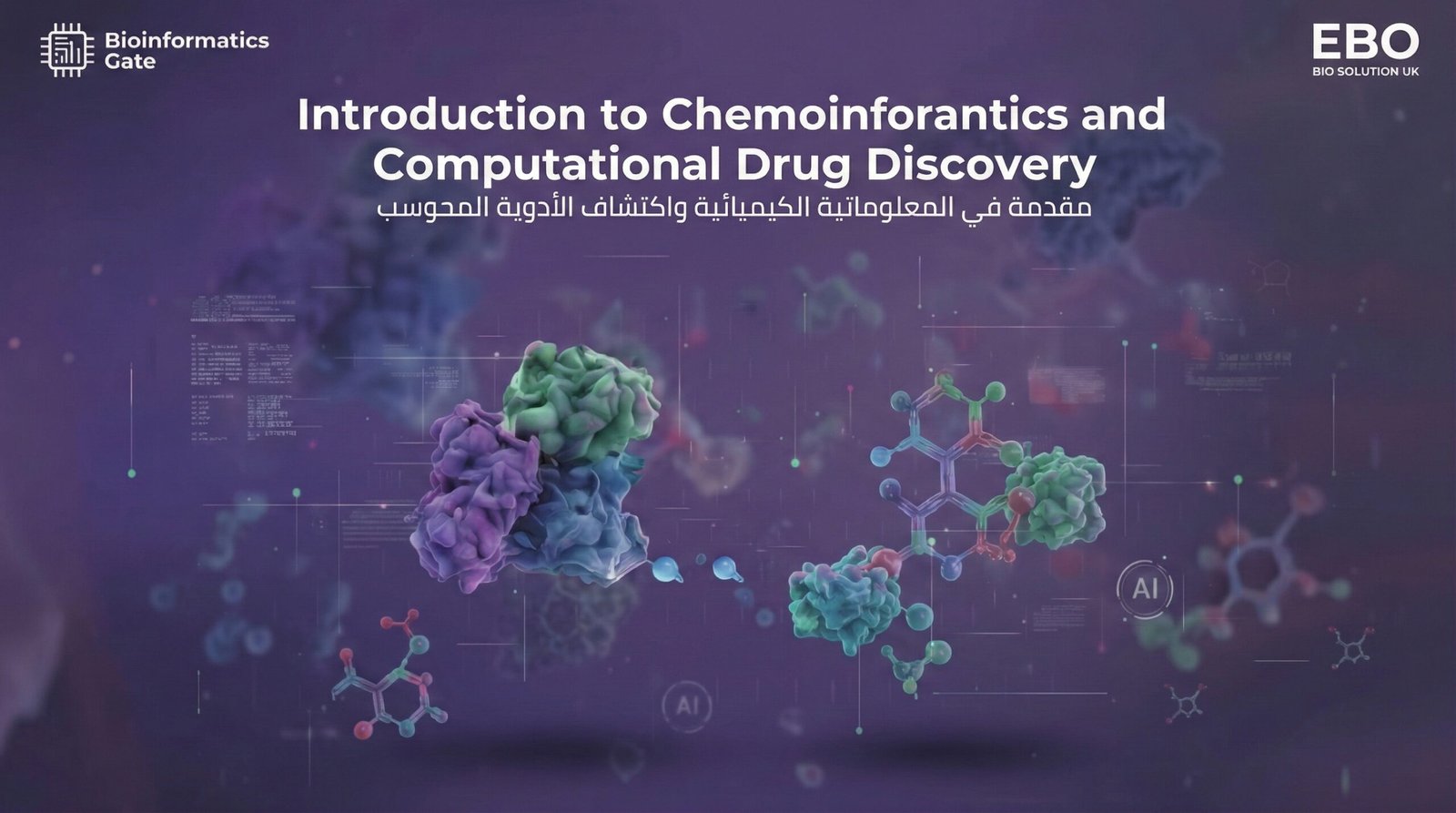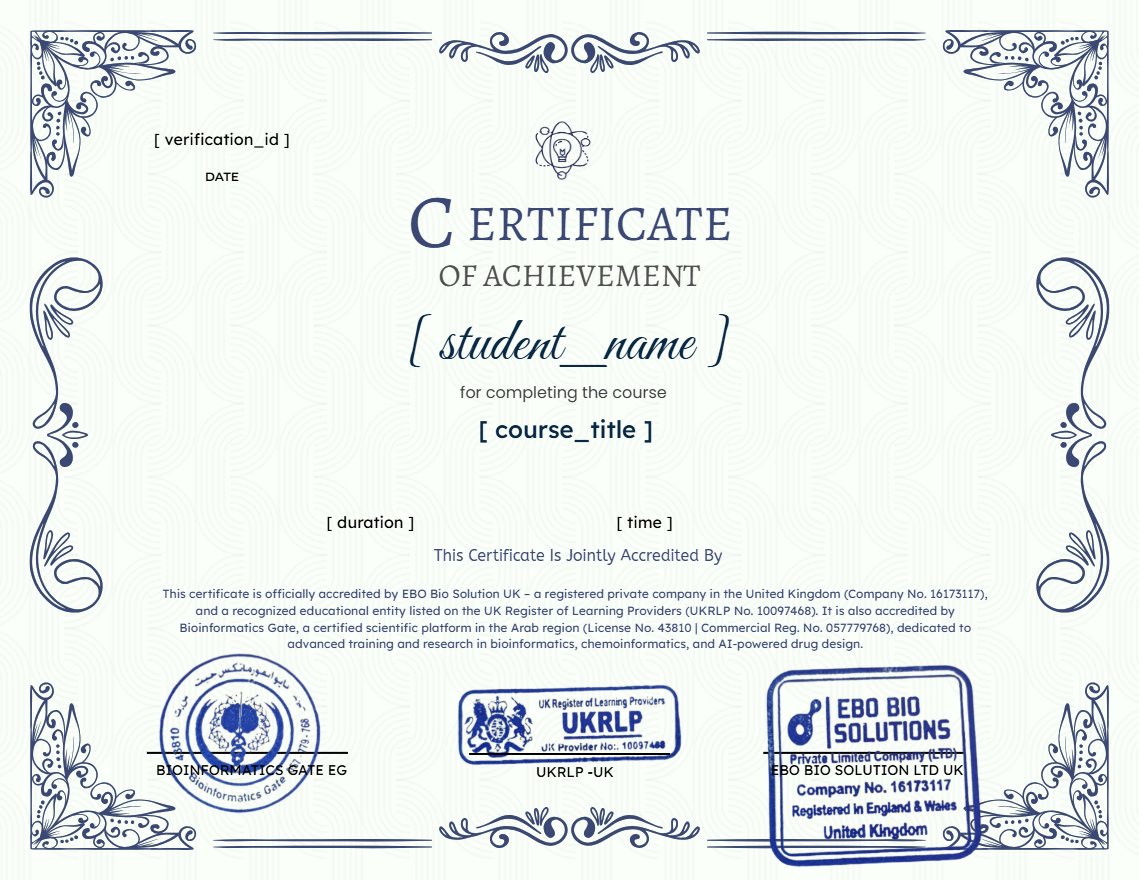Practical Chemoinformatics | Book Club |
Course Prerequisite(s)
- Please note that this course has the following prerequisites which must be completed before it can be accessed
-
 1 – Introduction to Chemoinformatics and Computational Drug Discovery
1 – Introduction to Chemoinformatics and Computational Drug Discovery
About Course
Description
This book provides a comprehensive guide to the practical applications of chemoinformatics in drug discovery and molecular modeling. It covers methodologies such as molecular descriptors, virtual screening, and QSAR (Quantitative Structure-Activity Relationship) modeling, offering hands-on protocols and case studies for researchers. The book is a valuable resource for understanding how computational tools are transforming chemical research and drug development.
Implementation Plan for the Book Club Over Two Months
1. Book Selection
-
Book: Practical Chemoinformatics.
-
Level: Intermediate to Advanced.
-
Total Chapters: 12 (approximate).
2. Chapter Division
-
The book will be divided into 8 parts (one part per week).
-
Each week, members will read 1-2 chapters depending on the length and complexity.
3. Weekly Schedule
-
Week 1: Chapter 1 (Introduction to Chemoinformatics) + Chapter 2 (Molecular Descriptors).
-
Week 2: Chapter 3 (Chemical Databases) + Chapter 4 (Data Mining in Chemoinformatics).
-
Week 3: Chapter 5 (Virtual Screening Techniques) + Chapter 6 (Molecular Docking).
-
Week 4: Chapter 7 (QSAR Modeling) + Chapter 8 (Pharmacophore Modeling).
-
Week 5: Chapter 9 (Case Studies in Drug Discovery) + Chapter 10 (Challenges in Chemoinformatics).
-
Week 6: Chapter 11 (Future Directions) + Chapter 12 (Conclusion and Summary).
-
Week 7: Review and Recap of Key Concepts.
-
Week 8: Final Discussion and Evaluation.
4. Weekly Meetings
-
Duration: 1-2 hours per meeting.
-
Agenda:
-
Discuss the assigned chapters.
-
Explain complex concepts with the help of an instructor.
-
Answer members’ questions.
-
Open discussion on ideas presented in the chapters.
-
-
Use interactive tools like presentations or videos to enhance understanding.
5. Interactive Activities
-
Workshops: Organize practical workshops on using chemoinformatics tools (e.g., molecular docking software).
-
Side Discussions: Create a Facebook or WhatsApp group for discussions outside meetings.
-
Weekly Challenges: For example, writing a summary of the week’s chapters or analyzing a small dataset.
6. Final Evaluation
-
At the end of the two months, conduct a final evaluation:
-
Survey to assess the reading and meeting experience.
-
General discussion session about the book as a whole.
-
Members share their personal evaluation of the book and what they learned.
-
What Will You Learn?
- Understand the fundamentals of chemoinformatics and its role in drug discovery.
- Learn techniques for molecular descriptor calculation and virtual screening.
- Gain practical skills in using chemoinformatics tools and software.
- Explore QSAR modeling and pharmacophore modeling methodologies.
- Apply computational methods to solve chemical research challenges.
Course Content
Before You Start: Book Club Orientation
-
00:00
-
00:00
Practical Chemoinformatics | Book Club
-
Practical Chemoinformatics | Book Club
Chapter 1
-
1 Abstract
05:28 -
1 .1 Chemoinformatics
00:00 -
1. 1 .1 Open-Source Tools 2
00:00 -
1 .1 .2 Introduction to Programming Languages
00:00 -
1 .2 Chemical Structure Representation
00:00 -
1 .3 Code for Including the Editor Applet in JChemPaint
00:00 -
1. 4 Definition of Templates
00:00 -
1 .5 Free Tools
00:00 -
1. 7 Commercial Tools
00:00 -
1. 8 A Practice Tutorial
00:00 -
1 .9 Introduction to Chemical Structure Formats
00:00 -
1. 9 .2 Graph based Representation 2D and 3D formats
00:00 -
1 .9. 4 FILE FORMATS
00:00 -
1. 10 2D and 3D Representation
00:00 -
1. 11 Abstract Representation of Molecules
00:00 -
1 .12 File Format Exchange
00:00 -
1. 14 Molecular Similarity
00:00 -
1. 15 Search for Relationship
00:00 -
1 .16 Similarity Measures
00:00 -
1. 17 Molecular Diversity
00:00 -
1 .18 Advanced Structure handling Tools
00:00 -
1 .19 ChemXtreme
00:00 -
1 .20 Virtual Library Enumeration
00:00 -
1 .21 Clustering
00:00 -
1. 22 Databases
00:00 -
1. 22. 7 Chemical Databases
00:00 -
1. 22 .8 Do It Yourself DIY
00:00
Chapter 2
-
Chemoinformatics Approach for the Design and Screening of Focused Virtual Librarie
00:00 -
2 .1 Introduction to Structure–Property Correlations
00:00 -
2. 1 .1 Descriptors
00:00 -
2. 1. 1 .2 Free Programs
00:00 -
2. 1. 1. 3 Tools Requiring An Academic License
00:00 -
2.1.1.4 Commercial Software to Calculate Molecular
00:00 -
2.1.1.5 In House Developed Open Source Tool
00:00 -
2.1.2 Online Property Prediction Tools
00:00 -
2. 1. 3. 1 Virtual Library Generation Enumeration
00:00 -
2 .1. 3 .2 Open Source Tools for Virtual Library Synthesis SmiLib
00:00 -
2.1.4 Virtual Screening
-
2. 1. 4. 1 Free Virtual Library Screening Platforms
00:00 -
2.1.5 Thumb Rules for Computing Molecular Properties
00:00 -
2. 1. 6 Do it Yourself
00:00 -
END OF Chapter 2 Chemoinformatics Approach for the Design
00:00
Chapter 3
-
Chapter 3 Machine Learning Methods in Chemoinformatic
00:00 -
3. 1 Introduction
00:00 -
3 .2 Machine Learning Models for Predictive Studies
00:00 -
3. 3 Machine Learning Methods
00:00 -
3. 4 Open Source Tools for Building Models for Drug Design
00:00 -
3 .4. 2 Waikato Environment for Knowledge Analysis WeKa
00:00 -
3. 4 .2 .1 A Tutorial for Building Classification Models Using LibSVM and Weka
00:00 -
3. 4. 2. 2 Obtaining Accuracy Using Random Forest
00:00 -
3. 4 .3 R Program
00:00 -
3. 5 Free Tools for Machine Learning
00:00 -
3. 5 .2 Rapid Miner
00:00 -
3. 5. 2. 1 Practice Tutorial for Building Machine Learning Models in Rapid Miner
00:00 -
3. 6 Commercial Tools for Building ML Models
00:00 -
3 .6. 1. 1 A Tutorial for QSAR Model Building of DHFR Inhibitors
00:00 -
3. 6. 2 IBM SPSS
00:00 -
3. 6. 3 Matrix Laboratory MATLAB
00:00 -
3 .7 Genetic Programming Based ML Models
00:00 -
3 .7 .1 A Practical Demonstration of GP Based Software
00:00 -
3. 8 Thumb Rules for Machine Learning Based Modelling
00:00 -
Machine Learning Methods in Chemoinformatic
00:00
Chapter 4
-
1 Abstract
00:00 -
1 Introduction
00:00 -
4.2 A Practice Tutorial Docking
-
4. 3 Docking Using Open Source Software
00:00 -
4. 3 .1 Autodock Steps
00:00 -
4 .3. 2 Docking Using AutoDock Vina
00:00 -
4. 4 Other Docking Algorithms
00:00 -
4. 4. 1 Induced Fit Docking
00:00 -
4 .4 .2 Flexible Protein Docking
00:00 -
4 .4. 3 Blind Docking
00:00 -
4 .4. 4 Cross Docking
00:00 -
4. 4. 5 Docking and Site Directed Mutagenesis
00:00 -
4 .5 Protein–Protein Docking
00:00 -
4.6 Pharmacophore
00:00 -
4 .6. 1 Pharmacophore Modelling in SCHRÖDINGER
00:00 -
4. 6. 2 Finding Pharmacophore Features Using MOE
00:00 -
4 .8 Rules of Thumb for Structure Based Drug Design
00:00 -
4. 9 Do it Yourself Exercises
00:00
Chapter 5
-
Abstract
00:00 -
5 .1 Introduction
00:00 -
5 .2 A Practice Tutorial for Predicting Active Site Using SiteMap
00:00 -
5 .3 A Practice Tutorial for Active Site Prediction Using MOE
00:00 -
5 .4 Free Online Tools for Active Site Prediction
00:00 -
5. 5 Homology Modelling
00:00 -
5. 6 A Practice Tutorial for Homology Modelling
00:00 -
5. 7 Model Validation Using Online Servers
00:00 -
5. 8 Receptor Based Pharmacophore
00:00 -
5. 9 Studies on Active Site Structural Features
00:00 -
5. 9. 1 Application of Active Site Features in Chemoinformatics
00:00 -
5. 9. 1. 2 Code for Obtaining the Ligand Coordinates X, Y, Z values from
00:00 -
5. 10 Thumb Rules for Active Site Identification and Homology Modelling
00:00 -
END ( Active Site Directed Pose Prediction Programs for Efficient Filtering of Molecules)
00:00
Chapter 6
-
Abstract
00:00 -
6 .1 Introduction
00:00 -
6 .3 Computational Methods in Reaction Modelling
00:00 -
6. 4 TS Modelling of Organic Transformations
00:00 -
6. 4. 2 A Practice Tutorial for Transition State and Intrinsic Reaction Coordinate Modelling
00:00 -
6. 4. 3 A Practice Tutorial Using Maestro–Jaguar
00:00 -
6. 4. 4 A Practice Tutorial Using Spartan
00:00 -
6 .5 Reaction Searching Approaches and Tools
00:00 -
6. 5 .1 Chemical Ontologies Approach for Reaction Searching
00:00 -
6 .5. 2 Reaction Searching Using Fingerprints Based Approach
00:00 -
6 .5 .3 Tools for Reaction Searching
00:00 -
6. 6 Reaction Databases
00:00 -
6. 6 .1 Tools for Reaction Library Enumeration
00:00 -
6. 6. 2 A Practice Tutorial
00:00 -
6. 7 Artificial Intelligence in Chemical Synthesis
00:00 -
6. 8 Modelling Enzymatic Reactions
00:00 -
6. 9 Thumb Rules for Performing Reaction
00:00 -
10 Do it You
00:00
Chapter 7
-
Abstract
00:00 -
7 .1 Introduction
00:00 -
7 .2 Fragment Based Drug Discovery
00:00 -
7 .3 Spectra Prediction Methods
00:00 -
7 .4 Spectra Prediction Tools
00:00 -
7. 5 Open Source Tools 7 5
00:00 -
7. 6 Proprietary Tools
00:00 -
7. 6. 4 Gaussian
00:00 -
7 .6 .5 ADF
00:00 -
7. 6 .7 Spartan
00:00 -
7. 6. 8 Spectral Databases 7 6 8
00:00 -
7 .7 Spectra Viewer Programs
00:00 -
7 .11 Do it Yourself
00:00
Chapter 8
-
Abstract
00:00 -
8. 1 What is Text Mining
00:00 -
8 .1. 1 Text Mining vis a vis Data Mining
00:00 -
8. 1. 2 A Snippet of Java Code Using the Above URL
00:00 -
8. 2 What are the Components of Text Mining
00:00 -
8 .3 Text mining Methods
00:00 -
8 .4 Why Text Mining
00:00 -
8. 5 General Text mining Tools
00:00 -
8 .5. 1 A Practice Tutorial with an Open source Tool
00:00 -
8. 5 .2 R Program for Text Mining
00:00 -
8. 6 Free Tools for Text Mining
00:00 -
8 .7 Biomedical Text Mining
00:00 -
8 .8 Chemically Intelligent Text mining Tools
00:00 -
8. 9 In house Tools for Text mining Applications for Chemoinformatics
00:00 -
8. 9. 1 Java Code Snippet for Data
00:00 -
8 .10 Thumb Rules While Performing and Using Text mining Result
00:00 -
8. 11 Do it Yourself
00:00
Chapter 9
-
Abstract
00:00 -
9. 1 What is a Workflow
00:00 -
9 .2 Need for Workflows
00:00 -
9. 3 General Workflows in Bioinformatics
00:00 -
9 .4 General Workflows in Chemistry Domain
00:00 -
9. 4. 4 KNIME
00:00 -
9 .4. 5 Workflow Examples
00:00 -
9. 5 Schrodinger KNIME Extensions
00:00 -
9 .5. 1 A Practice Tutorial
00:00 -
9. 6 Other KNIME Extensions
00:00 -
9 .6 .2 ChemAxon
00:00 -
9 .7 Protein–Ligand Analysis Based Workflows for Drug Discovery
00:00 -
9 .7. 1 A Practice Tutorial for Protein–Ligand Fingerprint Generation
00:00 -
9 .8 Prolix
00:00 -
9 .9 J ProLINE An In house developed Chem Bioinformatics Workflow Application
00:00 -
9 .10 Targetlikeness Score
00:00 -
9 .11 Databases and Tools
00:00 -
9 .12 Thumb Rules for Generating and Applying Workflows
00:00 -
9 .13 Do it
00:00
Chapter 10
-
Abstract
00:00 -
10. 1 What is a Portal
00:00 -
10. 2 Need for Development of Scientific Portals
00:00 -
10 .3 Components of a Portal
00:00 -
10 .4 Examples of Portal Systems
00:00 -
10. 5 A Practice Tutorial for Portal Creation
00:00 -
10. 5. 1 Custom Database connection and Display Table with
00:00 -
10. 6 A Practice Tutorial for Development of Portlets for Chemoinformatics
00:00 -
10. 6. 2 JME Portlet
00:00 -
10. 6 .3 Jchempaint Portlet
00:00 -
10. 7 Mobile Computing
00:00 -
10. 7. 1 Android Applications for Chemoinformatics
00:00 -
10 .8 Need of High Performance Computing in Chemoinformatics
00:00 -
10 9 Thumb Rules for Developing and Using Scientific Portals and Mobile Devices for Computing
00:00 -
10 10 Do it
00:00 -
REVIW
00:00
Earn a certificate
Bioinformatics Gate: Accredited in Egypt & UK. Certificates registered with Company House UK & UKRLP. Join us

Student Ratings & Reviews

